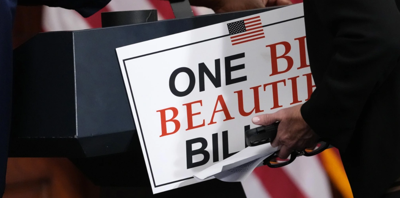DOVER, Del. - As President Donald Trump's "Big Beautiful Bill" gets closer to becoming law, concerns about Medicaid are brought up by Delaware senators and healthcare officials.
This upcoming holiday weekend, Trump is expected to make his "big beautiful bill" a reality. The over nine-hundred-page legislation describes around $4.5 trillion in tax cuts. Wealthy households will see a $12,000 increase while poorer people will lose $1,600 a year, according to the Associated Press. The bill also aims to provide $350 billion for Trump's border and other national security defenses.
U.S. Secretary of the Treasury Scott Bessent issued a statement Thursday promising a new "Golden Age" that will come from the proposed benefits within the bill by strengthening critical programs, national security and America's manufacturing sector.
"The OBBB will strengthen important programs for those who need them most and save taxpayer dollars by cutting waste, fraud abuse," said Bessent. "This consequential legislation cements the blue-collar boom and improves the lives of Americans on every rung of the economic ladder."
A big point of contention relating to the bill is the cuts to Medicaid that will occur once it becomes law. The AP also says that Republicans are aiming to cut back on Medicaid and food assistance for people below the poverty line to offset new spending.
Adults up to the age of 65 who are receiving Medicaid and food stamps will have a new requirement of working 80 hours a month to be eligible for these programs. Parents of children 14 and older will have to meet those requirements as well.
According to the Congressional Budget Office, it is estimated that 11.8 million Americans will become uninsured by 2034 if the bill becomes law, and 3 million more will not be eligible for SNAP benefits.
After the final vote for the bill, Delaware State Sen. Ray Seigfried and Sen. Marie Pinkney issued a joint statement admonishing the decision to pass the bill and criticizing Trump's decisions when making the bill, with a primary concern for Delawareans.
"But make no mistake: while everyone will be affected in some way, it will be low-income families and the residents of rural, southern Delaware who will suffer the most at the hands of Republicans in Washington," said Seigfried and Pinkney.
Brian Frazee, president and CEO of the Delaware Healthcare Association, issued a similar statement, honing in on the negative health outcomes that he says will be a result of its passing.
"We know the days and weeks ahead will be challenging as everyone digests the real-world impact of this legislation, but the estimates are grim: more than 50,000 Delawareans will lose their Medicaid coverage, more than 30,000 will become uninsured, and $4 billion in funding will be cut from the First State over the next 10 years as a result of this bill," said Frazee.
Despite these local concerns, Washington is pushing forward with these changes. Trump is expected to fulfill his self-imposed holiday deadline for the bill by signing it on July 4.







